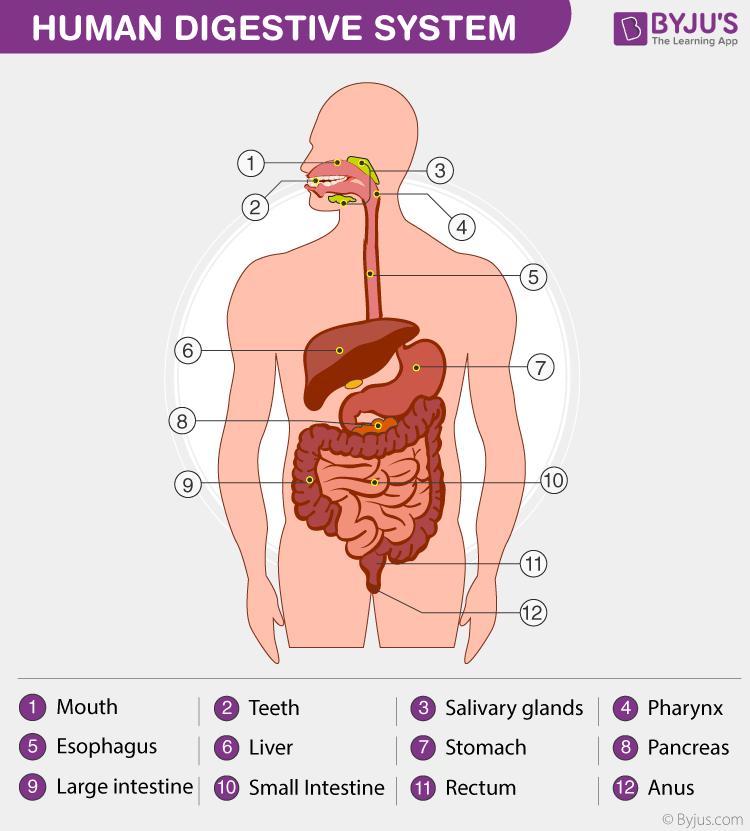Digestion is a vital process where complex food substances are broken down into simpler and absorbable molecules so that it could be easily absorbed by the different cells and tissues.
The digestive system plays a significant role in the digestion process, which is composed of the alimentary canal and other associated glands. The alimentary canal is divided into five main parts- mouth, esophagus, stomach, small intestine, small intestine and lastly large intestine.

The diagram of the human digestive system is useful for both Class 10 and 12. It is one among the few important topics, which are repetitively asked in the board examinations.
Also Refer: Alimentary Canal
Diagram Of Digestive System
The diagram below shows the structure and functions of the human digestive system.

Let learn the different parts of the human digestive system.
Mouth — It includes teeth, salivary glands and tongue. It is the beginning of the digestive tract and the process of digestion begins from the mouth, where teeth help by breaking and grinding the food molecules followed by the saliva mixing with the food particles.
Pharynx –It is a fibromuscular, Y-shaped tube-like structure, attached to the terminal end of the mouth. It is involved in the passage of chewed food from the mouth through the esophagus.
Esophagus —This is a muscular tube, measuring 25 cm long and located near the trachea connecting to the pharynx. It is the upper part of the gastrointestinal tract and is mainly involved in delivering the food particles from the mouth to the stomach.
Stomach –It is a hollow and muscular organ, situated towards the left side of the abdominal cavity and beneath the diaphragm. It is a vital organ, which functions by storing the food, provides enough time to digest meals, produces hydrochloric acid and digestive enzymes that maintain the process of digestion.
Small Intestine –It is a thin and long tube-like structure measuring about 9 to 10 feet long and also the part of the lower gastrointestinal tract. The small intestine is located just behind the stomach, which is found completely coiled and consists of folds and ridges.
Large Intestine –This is a thick and long tube-like structure measuring about 4 to 5 feet in length. It is present just beneath the stomach and wraps over the superior and lateral edges of the small intestine. It functions by absorbing water and support in the breakdown of wastes to fetch small nutrients.
Liver –The liver is a large, reddish-brown, triangular-shaped organ of the digestive system, which is located to the right of the stomach. It functions by processing the absorbed food from the small intestine, produces bile, which helps in the digestion of fat in the small intestine.
Also Refer: Types of teeth in humans
For more information about the Digestive System, its structure, functions and other related topics, visit us at BYJU’S Biology
Nice
Its very helpful
Thank you mam for sending me these notes they turned to be really helpful
Very nice
Nice explanation
Nice explanation
Thank you so much it’s helpful for me to learn the digestive system.
Not so bad
thank you mam for your kind help
Is it esophagus or oesophagus
Both are correct. Esophagus is predominantly used in American English, while oesophagus is predominantly used in British English.